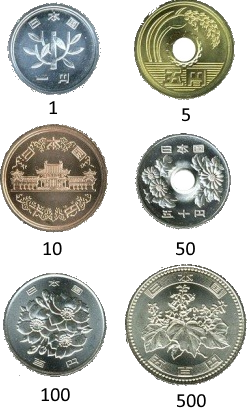If asked for an 'unlucky number', many Japanese might choose four as the unluckiest.

In the West thirteen is considered an unlucky number, and indeed that has crept into Japanese culture to a certain extent.
But the West's satanic number 666 has hardly any meaning at all in Japan. If anything, it might be regarded as a number not quite as lucky as 777.
However, some less-than-bright conspiracy theorists critical of Japan have pointed out that 666 is Biblical proof that Japan's capitalism is rooted in diabolism: 'The love of money is the root of all evil'.
If you add the value of all six current Japanese coins (1, 5, 10, 50, 100 and 500 yen), you get 666 yen. That provides apodeictic proof that the Japanese monetary system is diabolic.
And since it was the Japanese government who decided on the face value of the nation's coinage, that adds support to the conspiracy theory.
Well as we all know, every national government (or its designated monetary authority) determines which coin values to circulate within its currency system. Until the Republic of Korea discontinued circulating the 1-won coin in December 1980, that country's coinage also added up to 666. Why did they drop the 1-won coin? Because it was rarely used due to its minimal value (at that time, about one-sixth of a US 1 cent).
Korea, like Japan and all other countries, circulate coins which are useful. That is, beneficial, not diabolical.
In any case, it's a shaky conclusion that there's some satanic reason from just a subset of Japanese currency, which excludes paper notes (1,000, 2,000, 5,000 and 10,000 yen). It is proof only to those who want to believe such things.
Evil is jealousy, envy, hatred, and all the other unethical judgments or immorality we care to muster. It is not something that can be inherent in objects such as coins, or in systems such as money.
Let's look again at the source of this number: "...it is the number of a man..." The antichrist is a person; specifically, a man.
There's a phrase used in a different context: 'seek, and ye shall find'. If you want to see evil, then you will. Similarly, if you want to see good, whether it's money, people, or anything else, then it is always there to be found.
(This page had an update on 6 June 2006. That's 6/6/6, yet there was no single globally recognized devastating event that occurred specifically on that day.)
In 2005 a small piece of papyrus from Oxyrhynchus was found at Oxford University's Ashmolean Museum. I was part of the earliest-known version of the Bible's book of Revelation which shows 616 rather than 666.
This means we can look forward to lots more head scratching in the future, carefully avoiding silly conspiracy theories that lead us astray.
(Read more about 666 on our sister website The Mark of the Beast.)